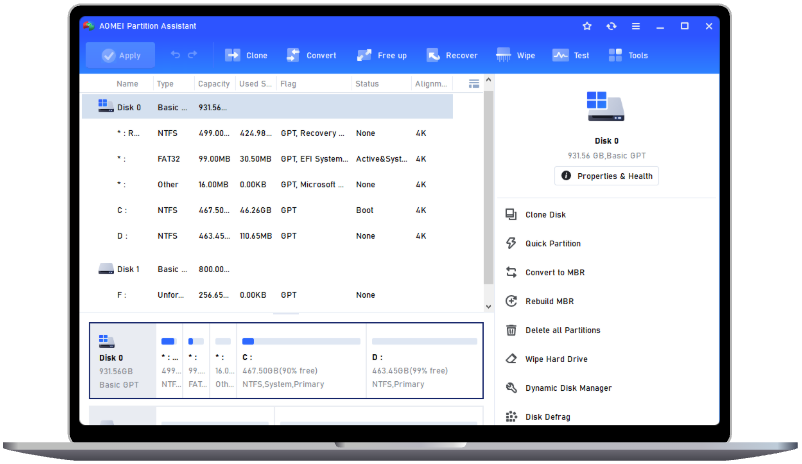How to Enable Windows 11 Automatic Defrag?
How to enable Windows 11 automatic defrag? Over time, your PC can get slower and more sluggish than before. Automatically defragging Windows 11 is one of the best solutions to resolve the issue. Here, you’ll learn to set schedule the defrag for Windows 11 on regular basis.
Can defrag make my PC run faster?
“It’s the third year since I bought my PC. Recently, I find it’s extremely slower than before. It’s sluggish and stutters now and then when I’m playing videos games. I heard that it could be fragmentation that caused the issue and to resolve it, I should defrag my hard disks on regular basis. Is that true. If yes, how can I perform the so-called defrag?”
What is Windows 11 automatic defrag and why do it?
Nowadays, even the most high-end Windows 11 computer can become slow sluggish over time which affects your daily use badly. Although there’re many measures you can take to make things better, one thing you should try is to set automatic Windows 11 defrag.
Over time, as files are saved, re-saved, or deleted on a hard disk, small information packets will eventually be scattered across the disk, rather than be stored all together. But why does your PC become slow?
On traditional spinning HDDs, these files take longer to find because the read head has to move to different spots on the hard disk rather than read data in consecutive sectors. So, defragmentation will put different part of a file back together in one place and thus, the data is effectively compressed. In turn, the speed of your PC will be improved and you’ll have a smoother user experience.
Automatic defrag is a more efficient way for Windows 11. In this way, you can determine how often your disk should be defragged – daily, weekly, or monthly. By scheduling the disk defrag, you don’t need to optimize those hard disks manually which saves much time.
How to automate defrag for Windows 11?
Windows 11 offers its own built-in way for disk defrag. Here, let’s first learn to defrag hard disks manually and later, the automatic way will be introduced. Then, after the introduction of the Windows 11 built-in tool, another third-party software that contains more powerful options for auto-defrag will be recommended.
Method 1. Use Windows 11 built-in defraggler
If you still have no idea how to defrag Windows 11 with its built-in program, follow the step-by-step guide and get it done correctly.
Manually defrag in Windows 11
1. To defrag Windows 11 manually, open the Settings app from the Start Menu and then, select “System” from the left sidebar.
2. Then, select the “Storage” option and next, select “Advanced storage settings”.
3. Click on “Drive optimization” from the list and you’ll be sent to a separate “Optimize Drive” window.
4. In the popup window, select the drive that you want to defrag and hit “Optimize” to launch the defrag.
Automatic defrag in Windows 11
If you think it’s too time consuming to defrag a disk every time you need, you may set a frequency for the disk defrag. Here, you’ll learn to perform automatic defrag for hard disks in Windows 11.
1. Still, in the “Optimize Drives” window, hit “Change settings” under the “Scheduled optimization” section. This will lead you to a separate window on the screen.
2. Then, tick the option “Run a schedule”.
3. Preset the frequency of the defrag – daily, weekly, or monthly.
4. Tick the option “Increase task priority …”.
5. Hit the “Choose” button to select the drives you need to defrag.
6. Tick the drives you want to defrag and meanwhile, tick the option “Automatically optimize new drives”. Finally, click on “OK”.
Method 2. Try a more powerful automatic defrag tool for Windows 11
Windows 11 built-in defraggler absolutely offers us a straightforward way to keep your PC in good status by defragging/auto-defragging your hard disks. However, as you can see, it can be a little bit complex if you’re a computing novices and meanwhile, the options it provides are far from enough. So, here, I recommend another even more full-featured and user-friendly third-party Windows 11 defraggler – AOMEI Partition Assistant Professional - that helps defrag/auto-defrag all your hard disk more efficiently. By using the defrag scheduling feature, you can determine at which clock the target disk must be defragged or whether the disk should be defragged only once at a certain moment in the future or once every day at a certain moment.
What’s the best way for automatic defrag in Windows 10/11? Try the most versatile disk manager to deal with it with ease!
Step 1. Install and launch AOMEI Partition Assistant Professional. When disk info appears on the home interface, right-click the disk, and choose “Disk Defrag”.
Step 2. In the popup window, hit “Schedule”.
Step 3. Now, you can choose the target drive, decide when to defrag, like every day, every week, or every month. And preset on what condition to run defrag.
Also, you can preset whether the disks should be defragged at startup or logon.
Only 3 steps! Much more convenient than the Windows built-in defraggler right?
Conclusion
How to enable Windows 11 automatic defrag? Generally speaking, there’re 2 choices – Windows built-in defraggler or third-party disk management program. By comparison, you can see the third-party program AOMEI Partition Assistant Professional recommended in the post is much easier and provides more options for automatic defrag in Windows 11. Moreover, apart from disk defrag, this software is able to enhance your PC performance with SSD 4K alignment as well. And if you want to check whether your partitions are in good status, you can try the “Check Partition” feature as well. If you’re a Server user, you can try the Server edition.

